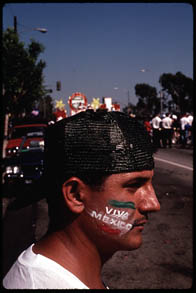
picture
from the serie Whay immigration problem? Joseph Rodríguez, 1996
|
|
|
THE
MANIFESTO OF THE PUREPECHA PLATEAU
|
|
|
|
For example, in the barrio of Compton in South L.A.-famous all over the world for its African-American gangs and rappers like Ice Cube-the Latino population (most of them recent arrivals from Mexico and Central America) is threatening to displace the African-American community. As this demographic change occurs, two opposing realities confront each other on the streets of Compton. On the one hand is a racial and class conflict between Blacks and Latinos: the appearance if not the reality of competition between the two for the few poorly paid jobs left in Southern California. "Pinches mayates," say the Mexicans of the Blacks. "Fuckin' wetbacks," say the Blacks of the Mexicans. Yet, out of this seemingly apocalyptic situation emerge new possibilities. Two years ago in Compton High School, a young Salvadoran was elected president of the student council. He won votes from both Blacks and Latinos. Because the kid speaks English and Spanish. Because he listens to rap and oldies and boleros and rock. Because his girlfriend is Black. Because he was practically born in the barrio (he came from his country of birth when he was six) and he can speak African-American English and Spanish equally well. We have two presents, two contradictory futures: the chaos of a modern Tower of Babel, or a new Pentecost in which all will understand each other even though we end up speaking different tongues. What threatens us with a new Babel is the economic rupture that pits "marginal" groups against one another over the crumbs of the new economic order, an order which clearly will not offer the majority access to the American dream. As the dream of a better life is thwarted for Mexicans in New York, African-Americans in Chicago, Turks in France, Nigerians in England and Purépechas in Michoacán, desperation grows, and with it, desperate attempts to survive: crossing the border in Arizona and risking dying of thirst in the desert; getting into drug trafficking, prostitution, street vending, the thousand ways you can live off the black market. Or unburdening yourself through violence aimed at people like yourself, like the Zacatecans and Michoacaners who bust each other's heads in St. Louis, or the Mexican "18 Street" gang and the Salvadoran "Mara Salvatrucha" gang who battle over Los Angeles's Pico Union barrio. Political unity among Latinos, if it ever happens, will be only momentary. The struggle against Proposition 187 in California was a classic example. In 1994, days before the vote that approved the anti-immigrant measure, more than 100,000 people marched in Los Angeles, including plenty of Chicanos and Salvadorans, from recent arrivals to third-generation Americans. After losing the vote, however, the movement fell apart. Desperation and frustration can bring people together, but it can also accelerate fragmentation. Today we are more fragmented than ever, which is terrible, which is beautiful. When the false homogenizing constructs of the past break up, awareness of our diversity (and tolerance, I hope) will increase-along with a sort of existential anguish. If "essential" Mexico doesn't exist, what can we use to fill the void? If the melting pot doesn't exist, how can we reconstruct the American Dream? This is not a time for unearthing old bullshit or for hanging your head. It is a time for expanding our concept of identity, of tolerance, of democracy. What's crucial is finding a way to connect our processes of cultural and social migration with our economic situation-and forming alliances across the lines of race and ethnicity to confront class inequity head-on. Because by now we all know, as has been said in Chiapas, that where there is hunger there can be no democracy. Or as any of the postborder Pure'pecha kids would say: if there ain't no job, let's head for the other side! |
|
Coyotes
helping people cross border |